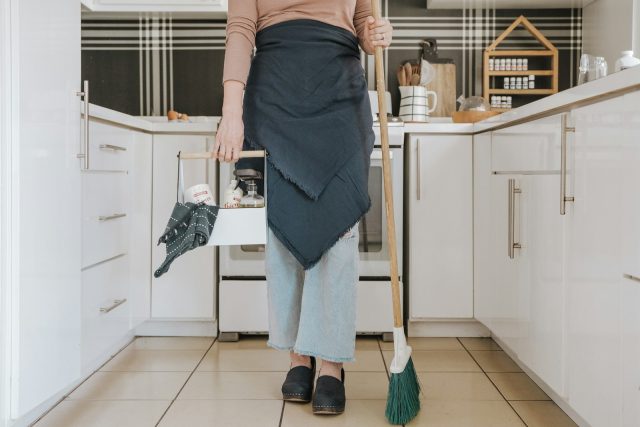Table of Contents
The Hidden Costs of Inefficient Cleaning Habits
Many people don’t realize how much unnecessary effort goes into cleaning their homes. Redundant tasks, poor planning, and using the wrong tools can make chores harder than they need to be. These inefficiencies eat away at your time, add long-term wear to surfaces when improperly cleaned, and can lead to stress when home upkeep feels impossible to manage.
For example, cleaning the same area multiple times during the week or procrastinating until the mess gets overwhelming leads to wasted time and energy. Poor scheduling—like tackling deep cleaning during a busy weekday—can result in half-finished tasks that require revisiting later. Wasteful habits may even cost you money, like replacing cleaning products more frequently than necessary or calling professional help for emergencies that could have been prevented.
For those aiming to minimize inefficiencies, outsourcing occasional help to specialized providers can be a game-changer. Services like St George cleaning services easily handle deeper tasks, allowing you to maintain focus on quicker routine care. This supports a more streamlined and stress-free upkeep approach.
Core Principles of Maintenance Efficiency
A clean home doesn’t have to mean constant work. By applying practical strategies, you can save time while achieving consistent results:
1. Prioritize what matters most
Focus on areas used the most, like kitchens or entryways. Tidying high-traffic zones first ensures noticeable results and keeps dirt from piling up elsewhere.
2. Optimize your tools and resources
Invest in multi-purpose cleaning products rather than stocking multiple single-use items. For example, microfiber cloths can replace disposable paper towels, cutting waste and costs.
3. Make “micro-cleaning” a habit
Instead of saving everything for a major cleanup, spend 5–10 minutes daily tackling small tasks, like wiping counters or vacuuming crumbs. Frequent touch-ups mean less time needed for deep cleans.
4. Commit to consistency
Set cleaning schedules that align with natural routines like post-meal tidying or starting laundry while preparing breakfast. Regular habits reduce the effort needed over time.
Balancing Speed and Thoroughness
Cleaning efficiently doesn’t mean rushing. Quick fixes often lead to missed spots and redoing tasks later. Finding the balance between speed and thoroughness is key:
- Practice time-blocking: Dedicate set amounts of time to individual chores. For example, reserving 15 minutes for wiping down surfaces minimizes distraction or procrastination.
- Follow the two-minute rule: If cleaning something will take less than two minutes (like folding one blanket or scrubbing a stain), do it immediately instead of letting it linger.
- Zone-based cleaning: Break rooms into zones—focus on one area at a time, such as decluttering bookshelves or cleaning windows. This prevents feeling overwhelmed by trying to tackle everything at once.
Imagine scenarios like prepping for visitors versus routine upkeep. Pre-guest cleaning requires efficient tidying of visible areas, while regular routines focus on long-term organization, like organizing closets or sorting drawers. These approaches ensure your home stays manageable without sacrificing quality.
Tools and Tech for Low-Effort Upkeep
Modern solutions can drastically soften the workload, making cleaning easier and faster. Here are some innovative tools and products worth considering:
| Tool | Benefit |
|---|---|
| Robot vacuums | Automated floor cleaning; great for homes with pets or busy schedules |
| Scheduling apps | Reminders to tackle chores or calendar-based cleaning plans |
| Eco-friendly sprays | Reduces chemical use; safer for children and pets |
| Extendable dusters | Easy access to ceiling fans and high shelves |
Switching to effective tools isn’t just about convenience—it also reduces physical strain while maintaining a clean environment.
Adapting Efficiency to Different Lifestyles
Everyone’s cleaning routine is unique, and strategies should adapt to different living situations:
Small homes
Small spaces benefit from consistent decluttering. Clear surfaces regularly and use furniture that doubles as storage (e.g., ottomans with hidden compartments).
Busy families
Involve household members in daily cleaning. Children can help organize toys or sweep crumbs, while adults alternate tasks like bathroom cleaning or folding laundry.
Workspaces
Assign priority zones—keep desks tidy and sanitize devices frequently to avoid buildup. Trash removal and floor cleaning can rotate weekly.
By applying universal steps like decluttering first and dividing tasks, you’ll find that any living space can stay clean with minimal effort.
From Overwhelm to Routine Mastery
Efficiency in cleaning transforms chores into manageable routines, freeing time for hobbies, relaxation, or family. Small consistent efforts compound over time into noticeable results—whether that’s less stress or a more inviting home environment.
Even one minor adjustment, like scheduling daily micro-cleaning, can turn maintenance into momentum, encouraging long-term consistency.
